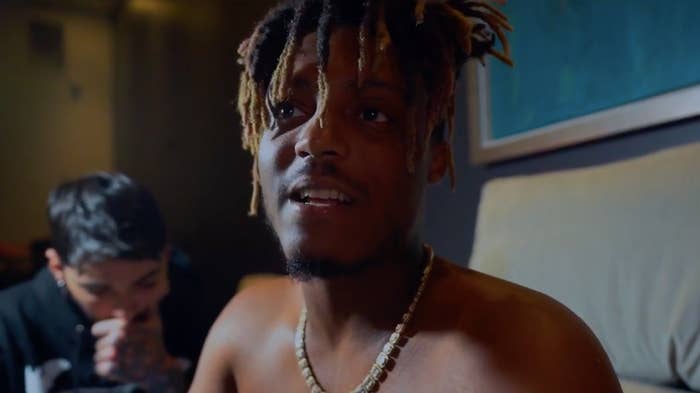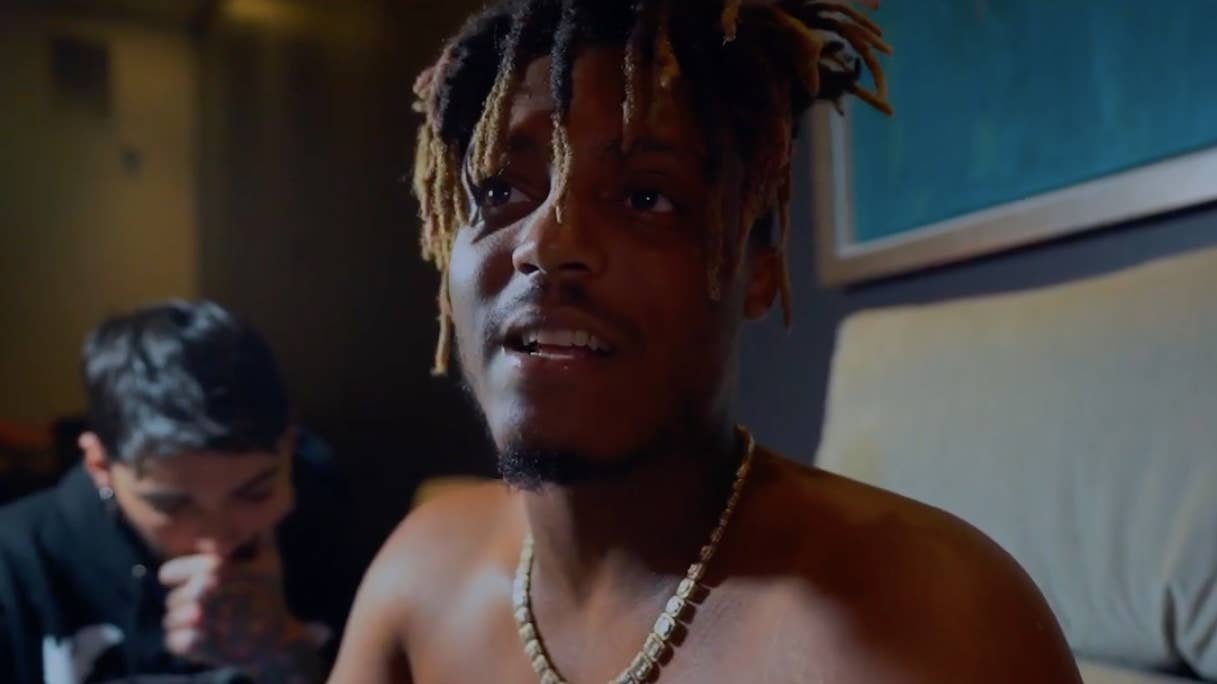
“I pop percs to numb all the pain cause it hurts to live/ I gotta take everything and sometimes it hurts to give.”
Juice WRLD delivers those poignant, off-the-dome bars in the opening scene of the newly released Juice WRLD: Into The Abyss documentary on HBO Max, which chronicles the late music superstar in the last two years of his life. After he finishes the freestyle, one of the people in the room rave “that’s hard.” And after his tragic overdose in December 2019, it’s hard to listen to.
The nearly two-hour doc is a holistic glimpse of who Jarad Higgins AKA Juice WRLD was, true to director Tommy Oliver’s stated desire to “[work] very hard to make sure that we see him completely—the good, the bad.” The scoreless, fly-on-the-wall style footage shows a brilliant artist who could slip into a lengthy freestyle on a whim, and an at-times happy-go-lucky 19-year-old doing all the playful things a teenager with unlimited resources would do. But those scenes seem far and few between clips where the vulnerable artist bares the fractured pieces of himself to a network of friends, music peers, and entourage who relate to his pain, and try to help him in their own ways, but were ultimately unable to halt tragedy.
Oliver told the Chicago Sun-Times that the documentary was crafted earlier this year “at the speed of thought,” true to the legendary freestyler’s legacy. The director received a hard drive full of footage from Juice WRLD’s estate, and got the green light from the artist’s mother, who told Billboard the final cut was an “honest” and “respectful” production. The footage was captured by videographers Steve Cannon and Chris Long, the latter of whom later had become Juice’s photographer and personal assistant. Long became so close to the music star that he reflects in the doc about hiding a gun in his camera bag to protect Juice during the plane search where he passed, shrugging and noting, “That’s the point of an entourage.”
Long came out in May and debunked rumors that Juice WRLD overdosed after panicking and swallowing pills because cops were at the airport waiting for his jet. He posted on Instagram, “J did not swallow a bunch of pills because the police where [sic] at the airport. We gave no fucks about them being there. He could have flushed them down the toilet if he cared. J was just hooked bad. The amount he took daily was absurd and he hid how much he really took from mostly everyone.”
The documentary reflects Juice’s heavy drug usage. What’s jarring is how many times his usage is so directly linked to scenes reflecting his musical success. When an entourage member reveals that his young son recites Juice WRLD lyrics, the rapper is pouring up a bottle of lean. Right after legendary radio DJ Big Boi says Juice “got it” after he freestyled on his radio show, the next clip shows Juice’s engineer trying to score points with Juice by letting him know he was the one who put lean in the fridge for him. During a part of the documentary when the team is celebrating selling “600,000 in eight hours” (presumably merch units), a visibly sluggish Juice notes that his “perc hit” in the midst of a photo shoot. Then he takes another half of a pill. Producer DJ Scheme expresses in the doc that Juice told him that he felt “detached” from his fame, and these scenes show him sadly disengaged from moments he probably dreamed of as a rap aspirant.
During the documentary’s epilogue, a baritone voice that either belongs to Grade A Productions co-founder Lil Bibby or G-Money reveals that the team figured out Juice was taking an estimated 20 pills a day at one point, as well as sipping lean, even after he publicly pledged to quit the latter. Both Long and friend D Savage say that they helped hide his lean usage from his girlfriend Ally Lotti, who didn’t want him using. They would hide the bottles in their rooms and pour mixes in soda cans so the purple concoction couldn’t be spotted. The documentary shows an environment where many of the people around him were also using, and everyone was moving too fast to fully consider the consequences of their choices.
The multi-platinum artist was operating at a breakneck pace through the duration of the doc, performing all over the world in 2018 and 2019. During one part of the documentary, Juice tells a radio host that he had been awake for four days straight, and the host tells him, “Every station has an interview with you trending.” Only toward the end of the doc does he seem to be residing in his actual home—before going back out on the road again. It becomes evident that the hectic schedule and expectations of rap fame were weighing on him. At one point, he tells iLoveMakonnen that he relished getting time to himself to “clean myself off some of these drugs” and “get some of this anxiety off my chest.”
Oliver does explore other emotional spectrums, though. There are candid scenes of Juice’s studio process, showing him freestyling what became beloved, platinum records during marathon recording sessions. There’s a poignant concert scene where he dedicates “Legends” to his father (who passed earlier that day) as well as a slew of rap stars, before earnestly telling the crowd they can do whatever they put their minds to. He rides dirt bikes with friends, has a playful lightsaber fight with Ski Mask The Slump God, and buys his mom a house.
The documentary shows a good-hearted teenager who loved to have fun and joke, while simultaneously dealing with trauma he appeared unsure how to heal. Sometimes his sense of humor hints at his inner turmoil. There’s a scene where his friend asks him if he wants a price breakdown on a $1,120 purchase of lean he just made for him, and Juice doesn’t. His friend jokes, “this nigga rich,” but Juice retorts, “I’m a junkie.”
‘Into the Abyss’ is a bittersweet portrait of a gifted, troubled artist who had the courage to cull through his turmoil and express it artistically. It makes one ponder the dichotomy of revered, fallen entertainers who were solace for millions but couldn’t find it for themselves.
There are several moments in conversation and freestyles where Juice WRLD says things that feel like cries for help. During an interview on the J Cruz Show, he reflects on his own mortality, noting he wasn’t trying to foreshadow anything in his lyrics, but admits, “I feel like everybody dying young.” Many of his freestyles reference discontent with his current life. While crafting what became “Fast” in the studio, he raps, “It’s been months since I’ve felt at home but it’s OK cause I’m rich / sike, I’m still sad as a bitch,” while staring at the camera for effect.
Near the end of the documentary, Bibby says he heard him reference death in over 20 songs, and explains he felt like Juice wanted to die. But maybe the connection could only be made in hindsight in a rap world where nihilism reigns, and no one can properly parse truth from artistic license.
G Herbo astutely notes on the doc that it was hard for him and others to “realize that’s the way [Juice] was feeling” because “it turned into so much beautiful art,” while admitting that he had moments where he partook in drug use with Juice WLRD. “I don’t know what we doin’ it for, we just doin’ it,” he plainly states. Polo G, who paid homage to Juice on The Goat’s “21,” explains that just because “you get some money that don’t mean your problems go away.” He adds, “So we still on the same shit, we just got more money to do it. Now you doin’ that shit at a higher rate.” He’s painfully on the mark about how the drug epidemic impacts the rap world, where artists make millions expressing their trauma—but don’t always find a healthy pathway to mend it.
View this video on YouTube
During a harrowing scene near the end of the doc, Juice is living the rap dream: on a private jet with the love of his life on his lap. But it doesn’t feel like the good life, as he starts to discuss the conception of his “Girls Are The Same” video before nodding off mid-sentence, waking up, and admitting he’s “fried.” He then takes another pill and offers the cameraman one before longingly asking his girlfriend to say that her name will be Higgins once they marry. After she fell asleep, he precociously asked the cameraman, “Do you want to watch a movie with me?”
The scene exemplifies Into the Abyss. The film was named after Juice and Ski’s Mask’s name for despondency. In the doc, Ski mask says that the abyss was about “how far you can fall into that pit of darkness,” adding, “When you’re in that mindset of the abyss everything hits you harder.”
The jet scene is a microcosm of the documentary, as he seems to be clinging for someone, or something, to help from sinking into that abyss of negative thought patterns. But life teaches us that every branch we cling to in descent toward the abyss will break until we realize we’re the root of our own happiness. There’s no way to know if Juice ever made that breakthrough, but sadly, he didn’t get to act on it.
Unfortunately, he passed a week after he agreed to go into rehab. Long tweeted, “Everyone around him tried really hard to get him to slow down. When he agreed to rehab it was because he wanted to lower his tolerance. He didn’t want to stop.” Long has occasionally posted about his relationship with Juice WRLD on social media. In November, he tweeted, “We talked a lot about the drug use and quitting off camera but, there is a lot of us doing drugs that got filmed. It hits different when you see it.”
Many of Long’s tweets reflect that he’s not in a good place after Juice’s passing. Earlier this month he tweeted, “I’m not strong enough for this. Juice was just one of the heavier things that broke me in a series of shitty things in life.” He also anticipated that people will be “mad” when they see Juice’s drug use in the documentary. And while there will be an urge for viewers to point fingers at the people who facilitated it, perhaps it would be better to consider the larger world where drug use is so rampant that many people have to reach the figurative rock bottom before they acknowledge that they have to stop. Some people never will.
Juice WRLD: Into The Abyss is a bittersweet portrait of a gifted, troubled artist who had the courage to cull through his turmoil and express it artistically. It makes one ponder the dichotomy of revered, fallen entertainers who were solace for millions but couldn’t find it for themselves.
The headlines have inundated us with a cruel paradox of modern rap fame: there are too many talented young artists who achieve music stardom but are unable to enjoy it because their raps manifested in horrible ways. We’ve seen it with artists whose music depicts the coldness of the streets being befallen by violence and jail time. And in the case of the late Juice WRLD, his music explored his battles with depression, anxiety and grief, and how that all fed the substance issues that ultimately claimed his life, like too many of his young music peers. This documentary tells his story, and theirs.
Our drug epidemic is a ceaseless depredation of society and it won’t be changing tomorrow, to the pleasure of big pharma and the prison industrial complex. But while we’re figuring out what role we play in the solution, documentaries like this can elicit more understanding and sensitivity to people who are struggling with substance issues.



